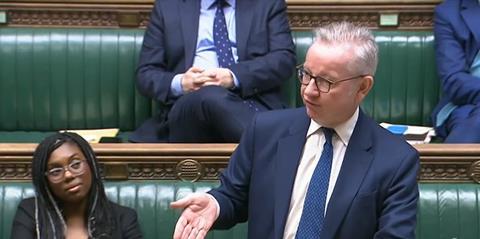Housing secretary’s comments come as MPs criticise Levelling Up and Regeneration Bill for no mention of zero carbon

The national planning policy framework to be published next month will aim to “drive up improved environmental outcomes”, Michael Gove has told the House of Commons.
The housing secretary made the comments following criticism of the lack of green commitments in the government’s flagship Levelling Up and Regeneration Bill, which had its second reading in the House of Commons on Wednesday.
Shadow housing secretary, Labour’s Lisa Nandy, criticised the government for there not being a “single mention of net zero in the bill”.
Meanwhile, Green MP Caroline Lucas said there was no mention of the net zero test in the levelling up regeneration bill, with the test, which estimates the impact of policy decisions on greenhouse gas emissions, “conspicuous by its absence”, she said.
Gove, the secretary of state for housing, answered: “The national planning policy framework that will be published in July will say significantly more about how we can drive improved environmental outcomes”.
The Government has previously set out a target of cutting carbon across all sectors of the UK economy to reach a net zero target by 2050.
Lib Dem MP for Westmorland and Lonsdale, Tim Farron, told the Commons the bill was “unambitious”. “There are huge environmental, housing and planning control crises to be solved, but the bill has not done so,” Farron said.
“Planning permission is being given for buildings that do not meet net zero and without a compulsion for them to be sustainable and to meet the climate emergency”, he added.
Gove pledged in the debate to “do everything I can to work” with regional mayors to ensure spatial planning is progressing to the net zero carbon target, in a response to a question from Labour’s Barnsley Central MP Dan Jarvis.
Before the reading of the bill yesterday, planning specialists called for more clarity on the infrastructure levy that the bill will allow councils to charge to developers.
In answer to a question from Labour MP for Luton South Rachel Hopkins, Gove said the levy would “make sure that there is appropriate rebalancing”. Communities would get more out of the levy if the development value, or value uplift, for the developer is greater over time, the secretary of state replied.
Nandy told the Commons there was “no clarity in the bill” about whether the levy would raise “more or less money than the current system”.
Conservative MP for the Cotswolds Geoffrey Clifton-Brown suggested: “If the infrastructure levy is properly implemented, it could provide substantial infrastructure.” “It could end the endless argument about delays and viability, because the developer would know before purchasing the site what they would be expected to provide.” Developers and councillors currently negotiate section 106 agreements to provide for local infrastructure including affordable housing, which the government claims will be largely abolished under the new system apart from in the cases of the largest developments.











No comments yet